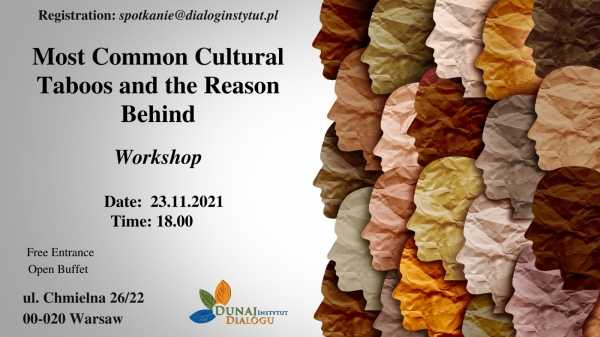The English version of the site has a very limited content.
To fully use waw4free, go to the Polish version.
To fully use waw4free, go to the Polish version.
Most Common Cultural Taboos and the Reason Behind
workshops
lecture
⌚ Start time: 18:00
📌 Place: Warsaw - Śródmieście dist., Dunaj Instytut Dialogu, Chmielna 26/22 (show on the map)
[wydarzenie oraz poniższy opis wyłącznie w języku angielskim]
Every culture has different taboos. If you want to learn and discuss the taboos of different cultures and the most common cultural taboos in the world, this event is for you. What constitutes the roots of the most common cultural taboos in the world? At the same time, religious taboos are another main topic of this event. Which religions have which taboos? What are the interactions between cultural and religious taboos? Let’s learn together how cultural and religious taboos affect our dialogues between people.
Paweł Tempczyk ( link ) – a psychologist (Warsaw University, Faculty of Psychology), group coach (GRUPA TROP), laughter yoga leader (Laughter Yoga International), PERSO.IN diagnost and a dolphintherapist (Good Village Foundation). I am an academic teacher at the University of Economics and Human Sciences (AEH) and the WSB University in Warsaw where I lead trainings of personal development. During spring and I summer I give dolphin therapy sessions in Turkey (Alanya and Kusadasi) for children with various disabilities. I am active in the Erasmus Plus field, both as a participant (training courses, youth exchanges, conferences in Belgium, Turkey, Portugal, Ukraine, Serbia, France, Ireland, Romania, above all) and an coordinator (the DEMOcrisis project in Serock).
The mini training will be focused on clichés and stereotypes that are common in our countries – how they influence our perception and our actions. The question is: are we aware of our differences in perception or do they “happen” unintentionally? And is intercultural learning able to deal with these differences? These are the main questions we will try to find answers to during our meeting.
Location: ul.Chmielna 26/22
Date: 23/11/2021
Time: 18.00
registration: spotkanie@dialoginstytut.pl
Every culture has different taboos. If you want to learn and discuss the taboos of different cultures and the most common cultural taboos in the world, this event is for you. What constitutes the roots of the most common cultural taboos in the world? At the same time, religious taboos are another main topic of this event. Which religions have which taboos? What are the interactions between cultural and religious taboos? Let’s learn together how cultural and religious taboos affect our dialogues between people.
Paweł Tempczyk ( link ) – a psychologist (Warsaw University, Faculty of Psychology), group coach (GRUPA TROP), laughter yoga leader (Laughter Yoga International), PERSO.IN diagnost and a dolphintherapist (Good Village Foundation). I am an academic teacher at the University of Economics and Human Sciences (AEH) and the WSB University in Warsaw where I lead trainings of personal development. During spring and I summer I give dolphin therapy sessions in Turkey (Alanya and Kusadasi) for children with various disabilities. I am active in the Erasmus Plus field, both as a participant (training courses, youth exchanges, conferences in Belgium, Turkey, Portugal, Ukraine, Serbia, France, Ireland, Romania, above all) and an coordinator (the DEMOcrisis project in Serock).
The mini training will be focused on clichés and stereotypes that are common in our countries – how they influence our perception and our actions. The question is: are we aware of our differences in perception or do they “happen” unintentionally? And is intercultural learning able to deal with these differences? These are the main questions we will try to find answers to during our meeting.
Location: ul.Chmielna 26/22
Date: 23/11/2021
Time: 18.00
registration: spotkanie@dialoginstytut.pl
